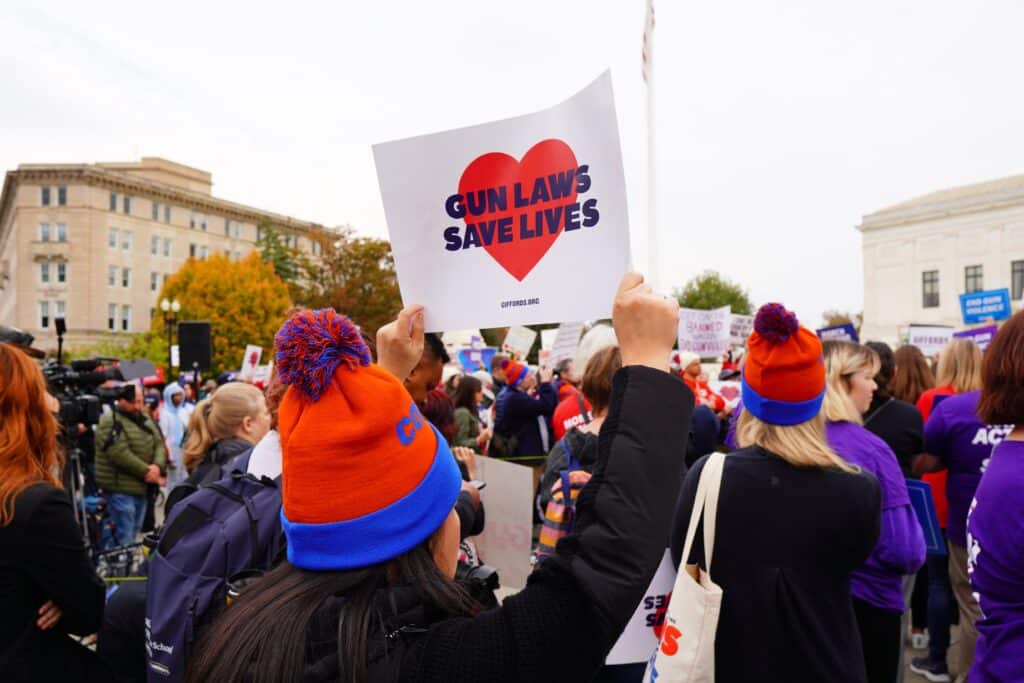Americans view our nation as exceptional in many ways. One aspect of our society that has long been undeniably unique is our gun culture. But that may be changing.
Contributing Writer Jake Fogleman looks at places around the world that have begun to loosen their gun laws. And many of the arguments for that liberalization will sound very familiar to American ears.
Speaking of the gun debate in America, a federal judge reupped one of the least persuasive arguments that have been used to uphold a gun restriction. It’s something more akin to a “one weird trick” gambit than serious legal reasoning. I explain why.
Plus, Bearing Arms’ Cam Edwards joins the podcast to discuss The Washington Post publishing graphic images of some mass shootings.

Analysis: Gun Debates in Other Nations are Starting to Mirror Our Own [Member Exclusive]
By Stephen Gutowski
In an age of unprecedented global exchange brought about by technology like the internet and social media, the latest American cultural export to gain ground abroad may be civilian gun ownership.
In both rhetoric and policy, political leaders and advocates in several places outside the US have recently taken a second look at allowing their citizens to arm themselves.
Just this week, Israeli National Security Minister Itamar Ben Gvir provided a public update on his government’s push to expand civilian gun rights in the wake of the October 7th attacks by Hamas. He announced they’ve received more than 236,000 new applications for firearms licenses since he loosened permitting requirements following the attack—an amount equal to the applications received over the prior 20 years combined. He argued this was a positive development and called upon the people of Israel to embrace firearms in terms that echo American gun-rights advocacy.
“I call on all those who are eligible — be patient with the backlog, and go get armed,” he said. “Guns save lives.”
This emphasis on guns as a life-saving tool in the hands of private citizens is one that American firearms advocates have advanced throughout the country’s history, particularly as the debate over gun laws has been a consistent feature of our political life. To see it in a country without a Second Amendment or corresponding tradition of widespread civilian gun ownership is noteworthy, to say the least.
Isreal’s embrace of armed civilians mirrors that of the Ukranian government and its push to change its laws to make it easier for civilians to own guns in the face of the Russian invasion. The country’s legislature passed a law expanding access to firearms and codifying a right to self-defense prior to Russia’s invasion last year, and its military began handing out rifles to any civilians willing to take up arms shortly after the invasion began. Some Ukrainian officials, including the country’s former top law enforcement official, have since said they hope to make widespread civilian gun rights permanent even after the war.
“For me, this is reason to believe that Ukrainians can be allowed to buy and store weapons to protect their own homes,” Denys Monastyrsky, the late Ukrainian Minister of Internal Affairs, said. “The post-war call to surrender weapons will not be heard, as most Ukrainians will continue to feel unsafe.”
Back in Israel, other supporters of the government’s decision to loosen its gun laws noted that support for more comprehensive civilian gun-carry rights was building even before the October 7th attacks. Simcha Rothman, Chair of the Israeli Knesset’s Constitution, Law, and Justice Committee noted the potential for loosened gun restrictions to be a lasting change. He pointed to past defensive gun uses by public gun carriers as a reason for that change, another prominent feature of the American gun debate.
“In the past, law-abiding citizens with handguns stopped and prevented many terrorist attacks in Israel,” Rothman recently told The Reload. “There are many, many terrorists that were killed on the site by law-abiding citizens carrying a gun. They didn’t wait for the law enforcement. That saved many, many people. So, every spike in terror was always bringing motivation.”
This embrace of public gun carry, already a common and relatively popular practice in the United States, has also emerged among populist, right-wing politicians in Latin America.
Ecuadorian President Guillermo Lasso instituted new reforms earlier this April to allow “the possession and carrying of guns for civilian use in personal defense” in response to a near-quintupling of the country’s murder rate since 2016. Those changes came on the heels of more than a dozen piecemeal gun law reforms instituted by former Brazilian President Jair Bolsanaro, who argued that “good citizens” should be allowed to defend themselves and that “an armed populace will never be enslaved.” Those moves saw private gun ownership in the country increase sixfold even as murder receded. His left-wing successor, Luiz Inácio Lula da Silva, has since rolled back many of those reforms in a stated pursuit of “a disarmed country.”
It’s worth noting that all of the aforementioned shifts in rhetoric and policy were directly precipitated by acute security threats, either real or perceived. In the cases of Ukraine and Israel, the shifting stance on civilian gun ownership was brought about by invasions and ongoing threats posed by an active war. The Latin American shifts, meanwhile, were in response to more general lawlessness and the risks posed to civilians by violent criminals.
Elsewhere, however, the adoption of American-influenced gun advocacy appears to be spreading without an obvious catalyst. The outlet Euronews. documented in August the rise of Firearms United, a pan-European firearms lobby claiming to represent more than 100 million gun owners on the continent who explicitly want to see gun laws in the EU brought more in line with the United States. And the way some of its members—at least those willing to speak with the outlet—talk about the issue will sound very familiar to anyone plugged into American gun politics.
“Civilian gun ownership can make authoritarian drifts very difficult because it gives people the ability to resist,” Andrea Favaro told Euronews. He later added that “being able to carry a firearm deters violent crime, especially those that by nature are committed against victims of opportunity.”
Another gun-rights advocate with the group Firearms UK told the outlet that gun ownership is “the measure of a free and open society and people’s ability to live their life on their terms in pursuit of their happiness.”
To date, however, the group hasn’t had much success in getting the EU to align itself with a more Americanized conception of gun rights.
On the policy front, while there have been some instances of gun law loosening in certain countries, none have to come anywhere near the level of liberalization in the US. Or even, really, US states with the most gun restrictions.
And, as in America, the debate over guns is ongoing in all of these nations. In some cases, such as Brazil, efforts to loosen gun laws have been met with political backlash and a subsequent reversal after the government changed hands.
However, how these policy changes have been discussed has undeniably taken on an American-tinged rhetorical style, linking firearms to freedom and self-preservation in places where gun ownership has not traditionally been viewed that way. American gun culture has long been an outlier on the world stage. If this trend continues, that could change.
Podcast: Critiquing the Washington Post’s Graphic Mass Shooting Pictures (ft. Bearing Arms’ Cam Edwards) [Member Early Access]
By Stephen Gutowski
This week, we’re discussing The Washington Post‘s controversial decision to publish graphic images from certain mass killings.
That’s why I reached out to Cam Edwards, editor of Bearing Arms and longtime newsman, to give his opinion on the story and discuss mine as well. Cam recently interviewed Parkland father Ryan Petty about The Post’s decision and how some families have reacted to it. He said Petty and several other families were disturbed by The Post publishing the images, especially since not everyone affected was directly contacted by the paper.
Cam argued that The Post‘s decision to selectively publish only pictures from mass shootings that featured AR-15s made the effort transparently political. We discussed how pictures from other mass killings are almost certainly equally disturbing. But The Post singled out AR-15s as part of a clear effort to get those particular guns banned, something that was underlined by an editorial published alongside the pictures.
Cam said he didn’t view The Post‘s efforts as journalism. Instead, he argued the paper was engaged in direct activism.
Plus, Contributing Writer Jake Fogleman and I talk about the strange reasoning a federal judge used to uphold Colorado’s gun waiting period.
You can listen to the show on your favorite podcasting app or by clicking here. Video of the episode is also available on our YouTube Channel. Reload Members get access on Sunday, as always. The show goes public on Monday.

Analysis: ‘One Weird Trick’ to Uphold Gun Restrictions Returns to Federal Court [Member Exclusive]
By Stephen Gutowski
A particularly flimsy legal theory has reappeared in federal Second Amendment litigation.
On Monday, US District Judge John L. Kane upheld Colorado’s three-day waiting period for gun purchases. He ruled the sales restriction didn’t violate the Second Amendment. His reasoning? The Second Amendment doesn’t actually protect gun sales at all.
“After examining the language of the Second Amendment using the Supreme Court’s analysis in Heller, I find, for the purposes of Plaintiffs’ Motion, that the plain text does not cover the waiting period required by the Act,” he wrote in Rocky Mountain Gun Owners v. Polis. “This conclusion is bolstered by the fact that the Act is a regulation on the commercial sale of firearms and thus is presumptively permissible.”
Judge Kane, a Jimmy Carter appointee, said the state’s restriction passes the Second Amendment test established in the Supreme Court’s New York State Rifle and Pistol Association v. Bruen decision by effectively short-circuiting it. Instead of examining the historical record for analogs to the modern waiting period, he argued that was unnecessary because the “right to keep and bear arms” doesn’t directly mention a right to buy, make, or sell them.
“From this reading of the plain text, it is clear the relevant conduct impacted by the waiting period—the receipt of a paid-for firearm without delay—is not covered,” he wrote. “Still, Plaintiffs attempt to equate the words ‘obtain’ and ‘possess.’ But these terms are not equivalent. To ‘keep,’ under the definitions provided in Heller, meant to retain an object one already possessed. It did not mean to receive a newly paid-for item, and it certainly did not mean to receive that item without delay. Likewise, ‘hav[ing] weapons’ indicates the weapons are already in one’s possession, not that one is receiving them.”
As I said when a judge in the Ninth Circuit employed the same logic to uphold a homemade gun ban last year, this is like a “one weird trick that plaintiffs hate” theory of Bruen. There’s no need to perform the analysis the Supreme Court requires if you cut the case off before it even really begins.
“Though it leads with a recognition of the primacy of Bruen’s ‘plain text’ point, [the plaintiff] seeks in its opening brief to jump ahead in the analysis to a historical/tradition assessment (and to jump ahead in Bruen to that decision’s discussion of how to conduct such an assessment),” Judge George H. Wu wrote in his ruling rejecting a request for a preliminary injunction against California’s ban on unserialized homemade guns. “But it has effectively attempted to avoid the necessary threshold consideration – does the ‘Second Amendment’s plain text’ cover the issue here? No, it plainly does not. AB 1621 has nothing to do with ‘keep[ing]’ or ‘bear[ing]’ arms.”
There has been a lot of disagreement among the lower court as to how best to implement the Bruen test. Judges have come down on different sides of whether the same restrictions have relevantly similar historical analogues. That disagreement will likely continue until the Supreme Court steps in and further clarifies how lower courts should carry out its test–a process it’s expected to start in its current case United States v. Rahimi.
But the idea that the Second Amendment guarantees the right to keep and bear arms but not the right to make or acquire arms isn’t likely to be part of that clarification. It’s simply too cute by half. The argument makes you wonder what exactly Judge Kane and Wu think the point of protecting keeping and bearing arms is if the government can simply ban their manufacture or sale.
Judge Kane seemed to realize this because he did go through an attempt to do the actual Bruen analysis. He ruled that the law would still stand even if the Second Amendment protects sales. He argued colonial-era laws that disarmed intoxicated people were relevantly similar to the waiting period because both aimed at “preventing impulsive acts of firearm violence.”
“These measures are sufficient to show that our Nation had a historical tradition of regulating the carrying and use of firearms by intoxicated individuals,” Judge Kane wrote. “Plaintiffs do not seem to dispute this determination, but instead focus on whether those regulations are ‘relevantly similar’ to the Waiting-Period Act. For the purposes of this proceeding, I hold that they are.”
That line of argument doesn’t seem much more likely to persuade the Supreme Court–if it ever makes it that far up the ladder. But it at least engages with the test the Court handed down. The idea that the Second Amendment provides no protection at all to the act of acquiring arms is little more than an attempt to hand wave away Bruen.
That’s it for now.
I’ll talk to you all again soon.
Thanks,
Stephen Gutowski
Founder
The Reload








Only Members can view comments. Become a member today to join the conversation.